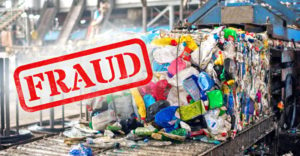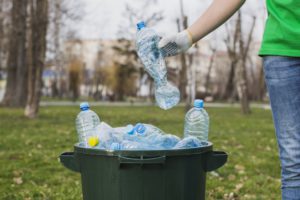50 Years of Fraud: Big Oil, Plastics Industry Lied About Recycling, Documents Reveal
Recent internal records reveal fossil fuel companies and the plastics industry peddled the myth of viable plastic recycling for over 50 years, despite privately acknowledging that existing recycling methods were inadequate, according to a new report from the Center for Climate Integrity.
Plastic makers and petrochemical industry players have engaged in a decades-long fraud aimed at deceiving the public about plastic recycling, according to a new report that spotlights freshly uncovered industry communications and internal documents.

The report comes as the global plastic waste crisis deepens, and as environmental advocacy organizations are increasingly calling for major fossil fuel and petrochemical companies to be held responsible for plastic pollution that poses a threat to human and planetary health.
“Despite their long-standing knowledge that recycling plastic is neither technically nor economically viable, petrochemical companies — independently and through their industry trade associations and front groups — have engaged in fraudulent marketing and public education campaigns designed to mislead the public about the viability of plastic recycling,” asserts the report, released by the Center for Climate Integrity (CCI) on Feb.15.
In detailing the plastics industry’s campaign of deception that dates back more than 50 years, the report reveals how the industry deployed a familiar strategic playbook to push back on threats of regulation by promoting a misleading narrative and false claims about plastics and recycling, despite knowing all along that plastics’ recyclability was more of a public relations message than an effective solution to the waste management problem.
“This evidence shows that many of the same fossil fuel companies that knew and lied for decades about how their products cause climate change have also known and lied to the public about plastic recycling,” CCI President Richard Wiles said in a statement.
“When corporations and trade groups know that their products pose grave risks to society, and then lie to the public and policymakers about it, they need to be held accountable.”
Long-held secrets
Plastics are derived from fossil fuels, and many large oil and gas companies like ExxonMobil, Shell and Occidental Petroleum have chemical divisions that produce plastics and plastic constituents.
Skyrocketing plastic production has led to a massive waste crisis, especially for single-use disposable plastic, and conventional recycling methods that have been around for decades have not proven successful in fixing the mess.
Plastic recycling rates in the U.S. are only around 5-6%, which is not surprising considering that most plastics are not designed to be recycled at any effective scale.
There are too many different types of plastics, each containing thousands of chemical additives, rendering sorting and purifying the waste material largely infeasible.
The process for producing recycled plastic is costly and the product is lower-quality, further limiting plastic recycling’s viability.
The plastics and petrochemical industries knew that recycling presented insurmountable challenges, the report demonstrates.
Among the revelations, the report details how corporate and trade association representatives privately acknowledged plastic recycling’s shortcomings decades ago.
Documents from the First National Conference on Packaging Wastes in 1969, for example, show the industry grappling with plastic packaging’s waste disposal problem, stating that the vast quantities of different polymer mixes and additives in plastic make the materials “virtually unrecoverable after use,” and admitting that the economics around recycling packaging waste are “virtually hopeless.”
The report highlights several industry communications:
- A 1969 American Chemical Society document notes: “It is always possible that scientists and engineers will learn to recycle or dispose of wastes at a profit, but that does not seem likely to occur soon on a broad basis.”
- A 1986 draft Solid Waste Fact Sheet from the Vinyl Institute, as another example, acknowledges in plain terms that “recycling cannot be considered a permanent solid waste solution, as it merely prolongs the time until an item is disposed of.”
- An Eastman Chemical Company employee in 1992 admitted that “it is more likely that we will wake up and realize that we are not going to recycle our way out of the solid waste issue.”
- Discussing the industry’s commitment to plastic recycling demonstration projects, an Exxon employee told staffers at the American Plastics Council in 1994, “We are committed to the activities, but not committed to the results.”
Yet the plastics industry successfully convinced the public, including governments and the media as well as consumers broadly, that recycling was a suitable solution to the plastic waste problem.
“The largest resin producers, including Exxon, Mobil, DuPont and Dow, invested tens of millions of dollars into various aspects of plastic recycling, including public relations efforts to shape consumer perception of recycling,” the report states.
It was part of a multi-pronged effort to sell the false promise of plastic recycling in order to quash prospects of restrictive regulations or product bans.

According to the report, the industry campaign included deploying trade associations and front groups to promote a pro-recycling narrative, communicating deceptive messaging to the public through public relations and advertising, announcing aspirational recycling targets that were never realized, investing in research and pilot projects to create the appearance of commitment to the “solution,” and even sponsoring educational materials to school children that misleadingly portrayed plastic recycling as environmentally friendly.
This industry deception continues as petrochemical and plastic producers promote “advanced recycling,” also known as chemical recycling, as an enhanced version of mechanical recycling.
But as the CCI report and other research emphasize, this purported waste management solution is neither “advanced” nor “recycling,” as it has been around for decades and generally converts plastic into petrochemical-based fuel rather than new plastic.
It faces similar economic and technical challenges that conventional recycling faces, yet the industry continues to tout chemical recycling as a breakthrough fix.
A call for accountability
The CCI report suggests that legal action against the industry is likely.
“Based on the growing body of evidence, municipalities and states are likely to pursue litigation, which could put an end to the industry’s deception, make the companies pay for the devastating harms they have caused to communities, and open the door to real solutions that are currently out of reach,” the report concludes.
Municipalities and states across the U.S. are already pursuing litigation against major oil and gas companies for allegedly lying about the climate crisis.
According to CCI, these companies should also be held liable for their lies about plastic recycling, which have exacerbated the plastic waste crisis.
“The oil industry’s lies are at the heart of the two most catastrophic pollution crises in human history,” Wiles said.
In response to the report, the Plastics Industry Association said the report was based on “outdated information and false claims.”
“This report was created by an activist, anti-recycling organization and disregards the incredible investments in recycling technologies made by our industry,” Matt Seaholm, president and CEO of the Plastics Industry Association, said in a statement. “Instead of working together towards actual solutions to address plastic waste, groups like CCI choose to level political attacks instead of constructive solutions.”
The American Chemistry Council (ACC) similarly decried the report.
“Unfortunately, this flawed report cites outdated, decades-old technologies, and works against our goals to be more sustainable by mischaracterizing the industry and the state of today’s recycling technologies,” the ACC said in a statement. “This undermines the essential benefits of plastics and the important work underway to improve the way plastics are used and reused to meet society’s needs.”
The group said America’s plastic makers have set an “ambitious goal for all US plastic packaging to be reused, recycled, recovered by 2040”, and they are working towards this goal by supporting systems and technologies that remake new plastics from used plastics.
yogaesoteric
March 18, 2024
